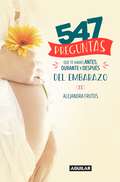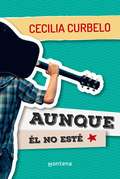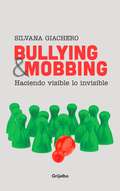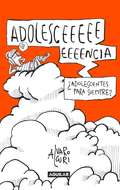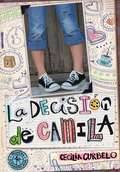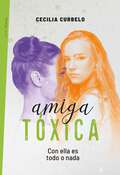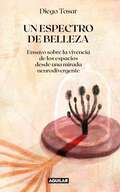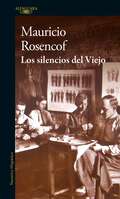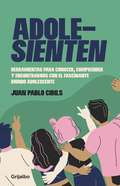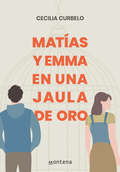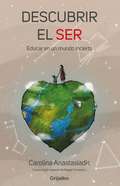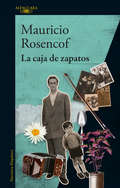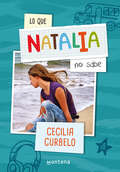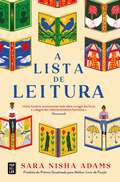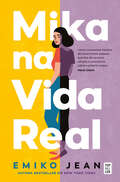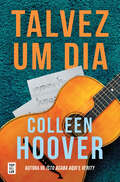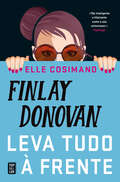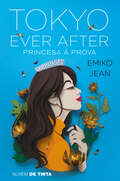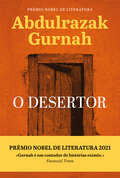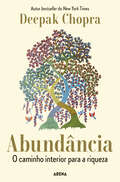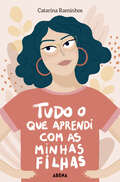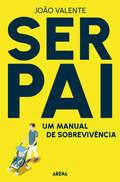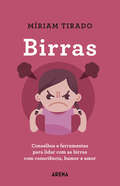- Table View
- List View
547 preguntas que te harás antes, durante y después del embarazo
by Alejandra FrutosEstructurado en base a preguntas y respuestas, con voces de especialistas de la salud, estas páginas se proponen acompañar a la embarazada y su pareja, con información actualizada, sólida y objetiva sobre numerosos temas relacionados al antes, durante y después de ese gran suceso en sus vidas. Al tiempo que se vive con inmensa alegría y expectativa, la experiencia de ser padres primerizos está llena de dudas, miedos e incertidumbres. Muchas veces, buscamos ayuda en amigos, familiares o en aquellos que ya lo han vivido, pero esa información que recibimos siempre es subjetiva y, a veces, sin quererlo, errónea. Alejandra Frutos apela a su amplia experiencia como periodista vinculada a temas de maternidad y como madre de mellizos, y a través de estas 547 preguntas logra que este libro se convierta en una herramienta de información indispensable, un manual de fácil acceso, ágil lectura e imprescindible para vivir un embarazo saludable. Estructurado en base a preguntas y respuestas, con voces de especialistas de la salud, estas páginas se proponen acompañar a la embarazada y su pareja, con información actualizada, sólida y objetiva sobre numerosos temas relacionados al antes, durante y después de ese gran suceso en sus vidas.
Aunque él no esté
by Cecilia CurbeloBruno y Guille, sumergidos en la batalla por sobrevivir al duelo, se enfrentan el uno contra el otro; en ese combate deberán confrontar a alguien más: ellos mismos. Bruno planea huir. Huir de su casa, de su familia o lo que queda de ella, luego de la muerte de su padre. Ya no tolera ver cómo se desintegra todo lo que para él era importante.La actitud de su hermano Guillermo y la aparente indiferencia de su madre agravan la situación. Solo la música que escuchaba su papá le transmite algo de paz. Bruno y Guille, sumergidos en la batalla por sobrevivir al duelo, se enfrentan el uno contra el otro; en ese combate deberán confrontar a alguien más: ellos mismos.Tras vender más de 70 mil ejemplares de sus obras, Cecilia Curbelo se ha convertido en la escritora de literatura infantil y juvenil más exitosa de Uruguay. Sus libros tienen un éxito rotundo: crearon una legión de fieles lectores, extendida por los países latinoamericanos y España.En 2012 recibió el premio Bartolomé Hidalgo, categoría Revelación. Desde ese año, y de manera consecutiva, también ha recibido el galardón Libro de Oro, al libro más vendido. Ambos premios son otorgados por la Cámara Uruguaya del Libro.
Bullying & mobbing: Haciendo visible lo invisible
by Silvana GiacheroEl bullying - o acoso en los centros de estudio - y el mobbing - o acoso laboral - han existido siempre, pero ahora se miden sus graves consecuencias en la psiquis y en la salud en general, y están alcanzando nuevas formas más crudas y sutiles. Este libro te ayudará a reconocer esas situaciones y a actuar. Probablemente recuerdes las bromas pesadas con que te molestaban de niño, o a ese compañero que te hacía la vida imposible; incluso puede que tú le hayas arruinado sistemáticamente los recreos a alguien. Probablemente estés asediado por un compañero de trabajo que te hostiga y te ha quitado las ganas, convirtiendo tu día en un infierno, ante la mirada impávida del entorno. Hay una posibilidad en cinco de que tu hijo esté siendo acosado o esté participando directa o indirectamente del hostigamiento a un compañero. Y es casi seguro que en tu área de trabajo estés presenciando alguna forma de maltrato psicológico. El bullying - o acoso en los centros de estudio - y el mobbing - o acoso laboral - han existido siempre, pero ahora se miden sus graves consecuencias en la psiquis y en la salud en general, y están alcanzando nuevas formas más crudas y sutiles. Ambos están emparentados porque comparten la misma dinámica y porque un chico acosador conduce a un adulto acosador. Las secuelas pueden ser a corto o largo plazo, llegando a causar estrés postraumático y derivar en patologías graves como depresión y pánico, y terminar en suicidio. No obstante, desde la psicología se afirma que hay salida y que es posible cortar con esta espiral de violencia. Este libro te ayudará a reconocer esas situaciones y a actuar. Ya sea porque eres víctima, o porque - quizás sin darte cuenta - eres cómplice de ese juego perverso. También es una herramienta para instituciones educativas y responsables de las organizaciones laborales que bregan por un clima de convivencia saludable y constructivo.
Adolesceeeencia: ¿Adolescentes para siempre?
by Alvaro AlcuriEl psicólogo Álvaro Alcuri, con mirada aguda y comunicación clara, reflexiona sobre esta etapa de la vida en este momento sociocul tural en que la adolescentitis, o adolescencia sin fin, nos define. A partir de su experiencia profesional, analiza situaciones co tidianas que atraviesan nuestros adolescentes y que nos interpelan como padres, educadores y ciudadanos. ¿Qué es la adolescencia? ¿Es el despertar biológico de la madurezsexual? ¿Es hormonal? ¿Social? ¿Cultural? ¿Es todo eso junto? ¿Es uninvento de la moder-nidad? El psicólogo Álvaro Alcuri, con mirada aguday comunicación clara, reflexiona sobre esta etapa de la vida en estemomento sociocultural en que la adoles¬centitis, o adolescencia sin fin,nos define. A partir de su experiencia profesional, analiza situacionescotidia¬nas que atraviesan nuestros adolescentes y que nos interpelancomo padres, educadores y ciudadanos.«La adolescencia sin fin de Peter Pan y el País del Nunca Jamás, debe,algún día, terminar. Nosotros, padres, edu¬cadores, figuras de autoridaddebemos comunicárselo a los muchachos, en tiempo y forma, fuerte yclaro. No hay otro camino. Si no "mueren" como adolescentes, nuncanacerán adultos, y sin adultos, estaremos construyendo una sociedadlight, con padres que lloran la milonga y les piden a otros, al PadreEstado, a educadores, mé¬dicos, psicólogos, policías, que solucionen loque ellos no pueden, que eduquen lo que no les resultó cómodo educar,que pongan los límites que no supieron poner.
La decisión de Camila
by Cecilia CurbeloCamila, de trece años, recibe en su celular un mensaje de texto que la deja muy intrigada. No sabe si seguir el impulso y averiguar de qué se trata, o quedarse tranquila ese sábado en su casa. Lo que Camila haga (y por lo tanto sus consecuencias) depende también de tu decisión. Camila, de trece años, recibe en su celular un mensaje de texto que la deja muy intrigada.No sabe si seguir el impulso y averiguar de qué se trata, o quedarse tranquila ese sábado en su casa.A medida que pasan las horas recuerda momentos claves de su vida: el cariño que la unía con su mejor amiga, la relación con su familia, la separación de sus padres, su primera menstruación. Luego tendrá que tomar una difícil decisión. ¡Y en eso la ayudarás vos! Lo que Camila haga (y por lo tanto sus consecuencias) depende también de tu decisión.
Las dos caras de Sofia
by Cecilia CurbeloLa vida de Sofía, de 14 años, parece perfecta. Sin embargo, en la intimidad de su casa es simplemente Sofi. ¿Cuál es la verdadera Sofía?, ¿qué terrible secreto esconde en el altillo de su hogar? Sofia, de 14 años, es la chica más popular y admirada del liceo. Hermosa, carismática, líder, egocéntrica, se hace llamar Soff. Su vida parece perfecta. Sin embargo, en la intimidad de su casa es simplemente Sofi. Las cosas no son lo que parecen. ¿Cuál es la verdadera Sofía?, ¿qué terrible secreto esconde en el altillo de su hogar? Conocé todosobre Sofía, la archienemiga de Camila, y atrevete a toma una decisión que llevará a la protagonista a tener un final ¡que dependerá de tu propia elección!
Amiga tóxica: Con ella es todo o nada
by Cecilia CurbeloPrimer título de la nueva serie TÓXICA. La vida de Julieta cambia rotundamente cuando en su camino se cruza Nicole. Niki se muestra segura, carismática, audaz, y, después de deslumbrar a Juli en el primer encuentro, se convierte en su compañera de clase y en su nueva mejor amiga. Así comienza un vínculo que se tornará intenso, y que irá asfixiando a Juli, desdibujándola, convirtiéndola en un apéndice. Y aunque las mejores amigas juran contárselo todo, Julieta sospecha que Niki le oculta algo muy grave. Ella necesita recuperarse, volver a rearmar su existencia, pero también descubrir qué es lo que está escondiendo Nicole. «Nuestra amistad es un cúmulo de sensaciones en blanco y negro. Es un contraste permanente entre la alegría y la pena. Entre la contención y el abandono. Entre la felicidad extrema de sentirme única y valiosa cuando me relata un secreto, y la angustia lacerante cuando Niki se enoja y se aleja».
Un espectro de belleza: Ensayo sobre la vivencia de los espacios desde una mirada neurodivergente
by Diego TosarDiego Tosar nos invita a ir en busca de aquello que nos une con las personas del espectro autista, más que de aquello que nos diferencia, para proponer otra posible arquitectura, una arquitectura repleta de sensibilidad para todos. Este libro es un intento por ampliar la mirada sobre la concepción de los espacios, los cuales no contemplan aún la diversidad que conforma nuestra sociedad. Diego Tosar lleva adelante un análisis reflexivo sobre las características de los entornos discapacitantes para las personas dentro del espectro autista. Propone así estrategias viables para modificar el sistema, en la búsqueda de garantizar un entorno que resulte más amable y que favorezca la convivencia. Una forma de interpretar el propósito de este ensayo es el de lograr una mejor comprensión sobre cómo percibe, cómo procesa y cómo se ve afectada la conducta de diferentes personas dentro del espectro autista, en relación a los estímulos que se le presentan en los ambientes. Por otra parte, este libro es también el ensayo de un padre, de profesión arquitecto, que desde el desconcierto intenta amorosamente comprender a su hijo. Esta vivencia personal se convierte en el motor que impulsa una reflexión personal y profesional ampliada y comprometida.
Los silencios del viejo
by Mauricio RosencofUn relato de amor y compromiso, de lucha y esperanza. Un hallazgo inesperado en la biblioteca de Mauricio Rosencof fue el impulso creativo de esta novela, cuyas raíces llegan hasta los orígenes de la peripecia de una familia judía que desembarca en Uruguay huyendo del Holocausto. Un libro cuyo proceso de escritura descubrió para el propio autor aspectos reveladores de la historia de su familia. El viaje de don Isaac en tren, para ir a charlar con su hijo preso, es el símbolo de otro viaje, más profundo y complejo, que une los destinos de diferentes generaciones en su lucha contra la injusticia y el desarraigo.
Adolesienten: Herramientas para conocer, comprender y encontrarnos con el fascinante mundo adolescente
by Juan Pablo CibilsEn Adolesienten podremos encontrar pistas sobre cómo trabajar con los jóvenes la vocación, la relación con sus amigos, la autoridad, los límites y la relación con los padres Adolesienten. Herramientas para conocer, comprender y encontrarnos con el fascinante mundo adolescente no es un libro de recetas. Es un conjunto de herramientas para que madres, padres, educadores y el propio adolescente identifiquen los desafíos de esta etapa fundamental en el desarrollo vital de las personas. Estas páginas acompañan ese momento clave en que el adolescente va abandonando su rol de niño, se descubre como alguien diferente, comienza a tomar conciencia de quién es y quién quiere ser, se cuestiona la relación con sus padres y con el mundo adulto en general. Es entonces que se evidencian los riesgos de crecer, las dinámicas con los pares, el acercamiento a un mundo nuevo con sus beneficios y peligros. Surge la articulación de deseos y necesidades desde lo digital, la construcción de la vocación y el caer en la cuenta de que para convertirse en adulto se deberá pasar previamente por esta etapa transformadora. El psicólogo Juan Pablo Cibils nos propone un libro cercano, amable, donde desde su visión profesional nos ayuda a vencer el miedo y la incertidumbre que tantas veces sentimos frente a un adolescente que nos desconcierta, para intentar descubrir y comprender el valor decisivo y creador de esta etapa. Conectando con aquello que adolecen y atendiendo a lo que realmente sienten, podrán encontrarse consigo mismos y con nosotros. Es necesario asumir el desafío de transitar saludablemente por la adolescencia para crecer felices. Adolesienten. Llegó el momento de escucharlos.
Matías y Emma en una jaula de oro
by Cecilia CurbeloLa vida de los mellizos Matías y Emma, de 15 años, está a punto de cambiar para siempre. La vida de los mellizos Matías y Emma da un vuelco cuando, a causa de la pandemia por coronavirus, son obligados a mudarse con su padre, con quien comparten los fines de semana o algunos días en vacaciones. Matías, disléxico como su papá, lo tiene en un pedestal: para él su padre es casi un superhéroe. Para Emma, muy crítica con el mundo que la rodea, su padre es irresponsable y superficial, porque, entre otras cosas, cambia de auto cada año y vive en Khronos, el edificio más glamoroso de la ciudad. A medida que pasan los días, la convivencia entre los tres se torna difícil, asfixiante por las severas restricciones que supone la pandemia. En paralelo, descubrirán que nadie es lo que parece a simple vista, ni nosotros mismos ni -mucho menos- aquellos a quienes creemos conocer. Khronos no es la excepción: bajo esa fachada de lujo y perfección, esconde secretos capaces de trastocar para siempre la vida de todos.
Descubrir el ser: Educar en un mundo incierto
by Carolina AnastasiadisUna invitación a padres, maestros y todos aquellos que estén en proceso de búsqueda, duelo o sanación, de conocerse. ¿Qué hay dentro de nosotros que nos hace ser de la manera que somos y no de otra? ¿Qué nos hace buenos en determinadas áreas y sentirnos más auténticos y plenos cuando nos desenvolvemos allí? ¿Con qué contactamos cuando eso sucede? ¿Qué es eso que se altera dentro nuestro (¿vibra?) ante ciertas situaciones, cosas o personas? Estas páginas son una invitación a padres y educadores a mirarse de manera profunda y descubrir aquello que los constituye, para modelar a sus hijos desde su esencia, su Ser, con toda la honestidad e imperfecta humanidad que allí radica. Por eso este libro es de educación y a su vez es espiritual, porque habla de educar desde lo humano y en lo humano, de lograr ver de verdad y tallar esa esencia desde el amor y con amor. Este es también un libro para todos aquellos que estén en proceso de búsqueda y al mismo tiempo en el desafiante camino de criar, para lo que no hay manual certificado, pero sí buenas pistas probadas desde áreas que aquí logran conectarse, como la educación, la ciencia y la filosofía. Es un libro que invita a educar con consciencia. El médico psiquiatra de niños y adolescentes Ariel Gold nos dice sobre su experiencia leyendo estas páginas: "Para mí la lectura fue una experiencia fascinante, en especial por las personas que pude conocer... Todas de verdad, como usted y como yo, tan diversas como usted y como yo. ¿Qué las hizo fascinantes para mí? La capacidad de poner en palabras lo trascendente, y que se entienda. Y que provoque reflexión". Dice Carl Honoré (autor best-seller y referente de la filosofía slow): "Descubrir el ser es una cálida y sabia guía en el arte del parenting. Inspirada en la ciencia, la filosofía y su experiencia, Carolina Anastasiadis nos muestra todo lo que nuestros niños necesitan para tener la mejor vida que podamos darles".
La caja de zapatos
by Mauricio RosencofMauricio Rosencof nos invita a un paseo por los temas que siempre lo han obsesionado, y que constituyen su particular universo literario. «Las fotos viejas tienen poco verde. No hay árboles en color. Todo es gris, blanco, negro. Son fotos de antes. Yo ya soy de antes. Soy parte del universo de la caja de zapatos. Y trato de acomodarme lo mejor posible.» Para ignorar a la capucha que lo aprisiona en un presente de dolor e injusticia, el narrador escapa con su imaginación hacia la caja de zapatos en la que se guardan las fotos, ese refugio donde los recuerdos son presente vivo. La infancia y juventud idealizadas en el Montevideo de los años cincuenta, el barrio, el primer amor, la persecución política, los secretos familiares, las secuelas del Holocausto; todo ello confluye en un texto sugerente, conmovedor y lleno de poesía. El libro más personal de Mauricio Rosencof.
Lo que Natalia no sabe
by Cecilia CurbeloEs una historia de Natalia y de cómo de un segundo para el otro su vida cambia drásticamente, y para siempre. Natalia llegó del liceo y se encontró a su madre esperándola con un pasaje de ómnibus. Sin explicación alguna la envió a la cabaña de una señora llamada doña Rosa, situada en un balneario lejos de la ciudad y de su propia casa. Lo peor: sin fecha de retorno. Confundida y aterrorizada, Natalia trata de ver lo positivo: el lugar es maravilloso, con sus playas extensas y sus cantos rodados. Sin embargo, bajo ese paraíso, se esconde algo turbio. Algo que está relacionado con ella misma. Natalia sabe que la vigilan y que muchos de los habitantes la observan con desdén murmurando a sus espaldas. Pero ¿por qué?. En esta aventura de descubrimientos Natalia comprenderá cuán fuerte ha sido hasta ahora, destapará secretos escondidos, reavivará viejos rencores y forjará lazos de amor, amistad y también la esperanza de una vida diferente.
A Lista de Leitura
by Sara Nisha AdamsHá livros capazes de mudar uma vida para sempre… Uma história sobre amizade, amor e o poder que os livros têm de mudar a vida de quem os lê. Mukesh leva uma vida pacata num subúrbio de Londres e tenta manter as rotinas estabelecidas pela sua mulher, Naina, que faleceu recentemente. Vai às compras todas as quartas-feiras, frequenta o templo hindu e tenta convencer as três filhas de que é perfeitamente capaz de organizar a sua vida sozinho. Aleisha é uma adolescente que trabalha na biblioteca local durante o verão e que, curiosamente, não gosta de ler. Até que encontra um papel amachucado dentro de um exemplar de Mataram a Cotovia com uma lista de livros dos quais nunca ouvira falar. Intrigada, e um pouco entediada com o seu trabalho, decide começar a ler os livros aí sugeridos.Quando Mukesh vai à biblioteca para devolver um dos livros de Naina e pedir outras sugestões de leitura, numa tentativa de criar laços com a neta, Aleisha recomenda-lhe os títulos da lista. É assim que, livro a livro, vão descobrindo a magia da leitura e encontrando novos significados para as suas vidas. E é através destas leituras partilhadas que Aleisha e Mukesh encontram a força necessária para lidar com os desgostos e problemas do dia a dia e reencontram a alegria de viver. Os elogios da crítica: «Um olhar tranquilo e ponderado sobre a solidão, a comunidade e os benefícios da leitura. Ideal para verdadeiros bibliófilos.» — Kirkus Reviews «Uma história serenamente bela sobre a magia dos livros e a alegria dos relacionamentos humanos.» — Newsweek
Mika na Vida Real
by Emiko JeanMika teve de abdicar de muita coisa na sua juventude, mas agora precisa de repensar a sua vida e redescobrir quem realmente é.A estreia na ficção adulta de Emiko Jean, autora de Tokyo Ever After Um telefonema inesperado pode mudar uma vida...Aos 35 anos, longe de ter a vida que imaginou, Mika Suzuki encontra-se num péssimo momento quando recebe o telefonema de Penny, a filha que deu para adoção dezasseis anos antes. Desejosa de ser alguém de quem a filha se possa orgulhar, Mika decide embelezar a sua vida, mas aquilo que começa por ser uma mentira inocente transforma-se numa vida inteira inventada, obrigando-a a fingir ser quem nãoé quando Penny anuncia que quer conhecê-la pessoalmente.Os pormenores da vida de Mika podem ser irreais, mas tudo o resto que partilha com a filha é verdade: os seus sonhos, as suas falhas e a herança cultural japonesa que Penny tanto deseja conhecer, para encontrar a sua própria identidade. Apesar de todos os seus arrependimentos, o convívio com a filha faz com que Mika se aperceba de que talvez não seja demasiado tarde para alcançar todos os sonhos de que se viu forçada a abdicar.
Talvez Um Dia
by Colleen HooverUma amizade inocente pode tornar-se em algo mais forte com que nenhum deles vai saber lidar. Um dos romances de maior sucesso de Colleen Hoover, finalista do Prémio Goodreads para Melhor Romance em 2014 Por altura do seu 22.º aniversário, Sydney parece ter tudo para uma vida feliz. Conjuga os estudos na faculdade com um emprego estável, tem uma relação invejável com Hunter e partilha casa com Tori, a sua melhor amiga. Mas tudo isto acaba por se desmoronar num abrir e fechar de olhos, deixando-a sem rumo e completamente destroçada emocionalmente.A braços com um desgosto amoroso e uma enorme desilusão, é na amizade e companheirismo de Ridge, o seu misterioso vizinho, que Sydney irá encontrar algum consolo e tentar reencontrar-se a si própria através da música, a grande paixão que os une. No entanto, embora seja evidente o bem que ele lhe faz, há coisas na vida de Ridge que Sydney não pode ignorar, sob pena de se transformar naquilo que mais despreza...
Finlay Donovan Leva Tudo à Frente
by Elle CosimanoQuando tudo parecia estar a entrar nos eixos, eis que Finlay se vê de novo enredada numa história que mais parece saída de um dos seus livros. Depois de Finlay Donovan Vai Arrasar, Elle Cosimano volta a trazer-nos uma divertida comédia de enganos que é também um romance e que é também um mistério. Ela vai dar cabo deles… Assim que conseguir organizar a sua vida! Para não variar, Finlay Donovan está atrasada na entrega do seunovo livro e continua assoberbada com os dois filhos pequenos e as contas por pagar. Felizmente, tem a ajuda preciosa de Vero, a ama das crianças, que se tornou também a sua melhor amiga, e o único cadáver que tem pela frente é o do peixinho de estimação da sua filha. Por outro lado, Finlay descobre que alguém quer matar Steven, o seu ex-marido. Ele pode ter-lhe causado um grande desgosto,mas é um bom pai, e ela está determinada a impedir que o pior lhe aconteça. A busca por quem poderá estar por detrás da ameaça à vida de Steven conduz Finlay ao submundo dos fóruns para mães, obrigando-a a aproximar-se em demasia de pessoas muito pouco recomendáveis. Enquanto tenta proteger a família, descobrir um assassino a soldo e escrever um livro, Finlay tem ainda de resolver a confusão emque se transformou a sua vida amorosa e encontrar o fio à meada da trama em que se vê envolvida, antes que esteja demasiado enredada para conseguir escapar. «Vibrante… Perante o desafio de corresponder à maravilhosa premissa do seu primeiro livro, Elle Cosimano faz um trabalho notável. O que virá em seguida?» Kirkus Reviews «Tão inteligente e hilariante como o seu antecessor.»PopSugar
Tokyo ever after: Princesa à prova
by Emiko JeanUma história romântica, divertida e comovente sobre uma jovem inadaptada que descobre ter sangue azul. Um dos livros mais aguardados do ano. BESTSELLER DO NEW YORK TIMES CONSIDERADO UM DOS MELHORES LIVROS DO ANO POR SCHOOL LIBRARY JOURNAL * PUBLISHERS WEEKLY * GOODREADS* COSMOPOLITAN * MARIE CLAIRE * ENTERTAINMENT WEEKLYNão é fácil ser nipo-americana numa cidade predominantemente branca da Califórnia. Talvez por isso, Izumi Tanaka, Izzy para os amigos, sempre tenha sentido dificuldade em adaptar-se à vida nos Estados Unidos. Criada pela mãe solteira, Izzy descobre a certa altura uma pista sobre a identidade do seu pai, que não é senão o príncipe herdeiro do Japão. O que significa que ela é nem mais nem menos do que uma princesa.Num turbilhão de emoções, Izzy viaja para o Japão para conhecer o pai e descobrir o país com que sempre sonhou. Mas ser uma princesa não se resume a vestidos de baile e tiaras. Há primos interesseiros, uma imprensa faminta, um guarda-costas sisudo — mas muito atraente... — e milhares de anos de tradição e costumes para aprender da noite para o dia. Izzy vê-se presa entre dois mundos e duas versões de si mesma. Em casa, nunca foi americana o suficiente e, no Japão, tem de provar que é japonesa o suficiente. Irá Izumi cair sob o peso da coroa, ou viverá ela o seu desejado conto de fadas? «Uma refrescante e realista representação dos nipo-americanos em busca das suas heranças que despertará interesse muito além das leitoras asiáticas.» Booklist «O espírito determinado de Izumi e a sua transformação conquistam completamente os leitores. Uma experiência divertida que dá vontade de ler uma e outra vez.» School Library Journal«Uma comédia romântica maravilhosamente minuciosa que me fez querer mudar para o Japão e nunca mais voltar.» Nicola Yoon, autora de Tudo, Tudo... e Nós «Apesar da história de amor digna de desmaios e dos palácios brilhantes, este não é um típico conto de princesas. Izumi é uma narradora corajosa, irreverente e adorável que luta para conciliar a sua educação americana com a sua herança japonesa.» Katharine McGee, autora de American Royals «O talento de Emiko para pormenores sumptuosos — Comida! Castelos! Confissões comoventes!Drama da corte! Flores de cerejeira por todo o lado! — trancou-me, impotente, num mundo de esplendor de onde nunca mais quis sair.» David Yoon, autor de Frank e o Amor«A princesa Izumi conquista o nosso coração enquanto nos faz rir sem parar. Com uma voz inesquecível e uma história de amor emocionante, Tokyo Ever After torna-se instantaneamente um favorito.» Gloria Chao, autora de American Panda
Lucy à beira-mar
by Elizabeth StroutDistinguida com o Prémio Pulitzer, a extraordinária escritora Elizabeth Strout regressa, neste romance, à sua icónica personagem Lucy Barton, protagonista de uma história de empatia, emoção, perda e esperança. Um dos melhores livros do ano: The New York Times Book Review, The New Yorker, Time, The Washington Post Quando o medo pandémico se apodera da cidade, Lucy Barton abandona Manhattan e muda-se com William, o seu ex-marido, para uma pequena cidade costeira no Maine. Nos meses que se seguem, os dois vivem numa casa perto do mar, experiência que vai revelar-se transformadora. Lucy e William voltam a ser os companheiros de há tantos anos — a diferença é que se encontram isolados do mundo em colapso, estando a sós com um complexo passado, com as suas memórias e com os seus desejos.Elizabeth Strout explora os interstícios do coração humano e compõe um retrato revolucionário e luminoso das relações íntimas durante os confinamentos. No cerne desta história estão os laços profundos que nos unem, mesmo quando separados: o vazio após a morte de alguém que amamos, ou o consolo de um antigo amor que afinal perdura. «O livro mais subtil e intensamente comovente de Elizabeth Strout. Uma obra verdadeiramente monumental.» The Guardian«Nenhuma outra escritora da atualidade revela este sentido de empatia. […] Que muitos leitores se sintam engrandecidos, reconfortados e genuinamente animados pela história de Lucy Barton.» The Boston Globe «Delicada e elíptica, Elizabeth Strout revela uma prosa elegante e enganadoramente ligeira.» The New York Times Book Review «Comovente e sombrio, maravilhosamente escrito e terno sem ser delicodoce, este romance é capaz de falar sobre amor e amizade, alegria e ansiedade, dor e tormentos, solidão e vergonha, e ainda sobre uma crescente inquietação. […] Revela uma compreensão sem limites da condição humana.» NPR«Uma escritora elegante, engenhosa e de apurada sensibilidade: um valor seguro para todos os leitores exigentes.» Babelia «A grande virtude de Elizabeth Strout é a desafetação: as histórias não precisam de ser grandiosas, porque a experiência humana também não o é; acontece no quotidiano, nas conversas, nos gestos. Os romances de Strout são universais.» Los Angeles Times«Uma escrita assim nasce de um compromisso para escutar, de uma sintonia perfeita com a condição humana, de um cuidado tão extremo para com a realidade, que deixa de ser uma competência para se tornar uma virtude.» Hilary Mantel «Uma das minhas escritoras de eleição. A complexidade, a espessura e a entrega que se vislumbram nestas páginas transformam-nas num feito milagroso.» Ann Patchett«Que escritora tão impressionante.» Zadie Smith
O Desertor
by Abdulrazak GurnahPRÉMIO NOBEL DE LITERATURA 2021 Um dos romances mais representativos de Abdulrazak Gurnah, que reconfirma o seu talento de narrador e de cronista de uma África ainda desconhecida. Ao romper de mais uma manhã, Hassanali está a caminho da mesquita quando um forasteiro branco, vindo do deserto, desaba a seus pés. Hassanali decide ajudar aquele homem — um explorador e orientalista inglês de nome Martin Pearce — levando-o depois para casa de um oficial, seu conterrâneo. Quando Pearce regressa para agradecer a Hassanali por lhe ter salvado a vida, também conhece a irmã dele, Rehana, com quem viverá uma história de amor proibido. Décadas depois, numa Zanzibar em vésperas da turbulenta independência do poder colonial europeu, Jamila, a neta de Rehana, viverá com Amin uma história de amor em tudo semelhante, que desafiará a família, a moral e as convençõesda sociedade. Obra representativa do talento de Abdulrazak Gurnah, O Desertor evoca o complexo ambiente social, religioso e cultural da África Oriental na época colonial através de duas histórias de amor, separadas pelo tempo, mas unidas pelo seu desfecho, evidenciando o intricado mosaico de uma África ainda desconhecida. «Uma proeza admirável… uma profunda investigação sobre a natureza do amor, da raça e do império.» San Francisco Chronicle «[Gurnah] é um escritor no máximo da sua forma, com um forte sentido da narrativa, um olho clínico para as dinâmicas familiares e uma total compreensão da psicologia corrosiva do colonialismo.» The Seattle Times«Gurnah é um contador de histórias exímio.» Financial Times
Abundância: O caminho interior para a riqueza
by Deepak ChopraDescubra as chaves para uma vida de sucesso, realização, plenitude e abundância. «Para alcançar uma riqueza duradoura, aquela que confere sentido, valor e sustento à vida, a sua existência diária deverá assentar na generosidade do espírito. Tudo o que desejar para além disso surgirá de forma natural.» DEEPAK CHOPRA Muitos de nós vivem e agem a partir de uma mentalidade de carência, escassez e limitação. Concentramo-nos no que não temos - segurança financeira, confiança, um relacionamento íntimo -, o que faz com que nos sintamos inseguros e desajustados. Pensamos: «Se conseguisse ter essas coisas, poderia ser feliz.» Mas medir a riqueza em dinheiro ou bens materiais deixa-nos esgotados e espiritualmente vazios. Insistir em lutar por mais, significa, muitas vezes, que o nosso ego controla os nossos pensamentos, ações e reações, o que nos impede de alcançar algo maior: uma verdadeira sensação de paz interior, aceitação e realização. No entanto, existe um caminho interior para a prosperidade e a abundância, que, uma vez traçado e explorado, oferece acesso às grandes riquezas do Universo e às possibilidades ilimitadas da vida. Em Abundância, o autor bestseller internacional Deepak Chopra ilumina esse caminho para o sucesso e a plenitude, ajudando-nos a explorar um sentido mais profundo de consciência, de modo que nos tornemos agentes de mudança nas nossas próprias vidas. Misturando ensinamentos antigos e práticas espirituais com a sabedoria que acumulou ao longo de quatro décadas como a principal figura da medicina mente-corpo, Chopra demonstra como transcender sentimentos autogerados de limitação e medo, para experimentar a verdadeira abundância em todos os aspetos da vida. Oferece um plano de sete etapas, juntamente com meditações e técnicas de atenção plena, o que nos ajuda a focar e dirigir a nossa atenção, energia e intuição, para podermos experimentar estabilidade, riqueza, conhecimento, criatividade, amor e verdadeiro poder. «Um guia envolvente destinado a "transformar consciência em riqueza" por meio do ioga e da meditação.»Publishers Weekly
Tudo o que aprendi com as minhas filhas
by Catarina RaminhosUm livro na primeira pessoa feito de humor e amor Com três letrinhas apenas se escreve a palavra mãe, mas para filhas é preciso o dobro. No caso da Catarina, o triplo: da paciência, da disponibilidade, da concentração, da comida… Todos os dias são dias de ensinar alguma coisa: que não se come com as mãos, que a roupa suja é para pôr no cesto, que a sociedade espera muito mais das mulheres do que dos homens… Mas a verdade é que uma mãe também aprende. Mesmo naqueles dias em que já não pode ouvir as filhas que não se calaram desde que saltaram da cama. Catarina Raminhos tem aprendido muito. Por exemplo, que as camisas largas e compridas são para se usar com um nó, que pintar as unhas é uma forma de empoderamento, que as riscas vão bem com bolas, afinal, ou que o amor pelos filhos é mesmo incondicional. Também aprendeu que com o nascimento de um filho, nasce um medo mesmo a sério que nunca mais desaparece. Por outro lado, ficou a saber recentemente que ninguém morre por não tomar banho todos os dias. E se isto não é uma boa descoberta, não sabemos o que é. Com tantas horas diárias de aprendizagem, Catarina decidiu compilar as coisas mais importantes que as filhas lhe ensinaram e o resultado é este livro que porá qualquer leitor a chorar: seja com lágrimas de comoção, seja a rir às gargalhadas. É que a Catarina tem muita graça. E muita, muita paciência.
Ser Pai: Um Manual de Sobrevivência
by João ValenteSe vai ser pai: parabéns e boa sorte! Se já o é: continue o bom trabalho. Para ambos: este livro é (quase) tudo o que precisa para sobreviver. João Valente tem três filhos. Isso não faz dele um especialista, mas dá-lhe muita experiência e vontade de ajudar outros pais. Ser pai é uma das melhores coisas do mundo, mas também a mais assustadora. Pegar num filho pela primeira vez é avassalador e tentar adormecê-lo às quatro da manhã também. Mas nada tema. Este livro irá iluminar esse longo caminho e providenciar uns balões de oxigénio e umas garrafas de água metafóricas. Feito de experiência pessoal, este é o livro que o autor gostaria de ter lido antes de ter sido pai pela primeira vez. Ou pela segunda. Ou pela terceira.
Birras: Conselhos e ferramentas para lidar com as birras com consciência, humor e amor
by Míriam Tirado«Com este livro, vou ajudá-lo a lidar com as birras do seu filho, mas também com as suas, para que não perca a cabeça e seja a mãe ou o pai que merece ser.» Aproveitando o seu próprio processo de mãe de duas filhas e profissional educadora consciente, a autora acompanhá-lo-á para que possa educar os mais pequenos de forma mais serena, amável e sem dor… inclusive no meio de uma birra. Todas as crianças as fazem e todos os pais terão de as enfrentar mais tarde ou mais cedo… são as famosas BIRRAS, capazes de perturbar até mesmo o pai ou a mãe mais calmos, conscientes e respeitosos. Acessos de raiva, teimas e birras revelam o que há de pior em nós, e a tristeza e a sensação de fracasso são inevitáveis. Míriam Tirado, consultora respeitada em parentalidade consciente, não pretende, com este livro, dar lições sobre como acabar com as birras, mas sim permitir-lhe encará-las como uma grande oportunidade de aprendizagem pessoal. Pode ser que lhe custe acreditar, mas as birras oferecem uma oportunidade de ouro para pais e filhos aprenderem e crescerem juntos. Os leitores opinam:«Um enfoque diferente e inspirador.» «Uma maravilha de livro.» «Recomendável para pais e profissionais.» «Necessário.» «Imprescindível.» «O livro que todo pai/mãe deveria ter.» «Autoconhecimento para amar e respeitar os nosos filhos.» «o livro perfeito para educar com respeito e consciência.»
